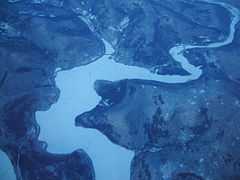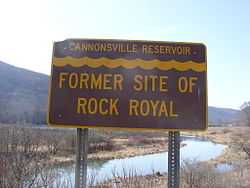Cannonsville Reservoir
| Cannonsville Reservoir | |
|---|---|
 | |
| Location | Delaware County, New York |
| Coordinates | 42°05′18″N 75°19′26″W / 42.0883°N 75.3238°WCoordinates: 42°05′18″N 75°19′26″W / 42.0883°N 75.3238°W |
| Type | reservoir |
| Primary inflows | West Branch of the Delaware River |
| Primary outflows | West Delaware Tunnel |
| Catchment area | 455 sq mi (1,180 km2) |
| Basin countries | United States |
| Water volume | 36,200,000 m3 (0.0087 cu mi) |
The Cannonsville Reservoir is a reservoir in Delaware County, New York, that was formed by the Cannonsville Dam at the west end of the reservoir, impounding over half of the West Branch of the Delaware River. It is the westernmost of New York City's reservoirs, being at the western portion of the Delaware Watershed. Placed in service in 1964, it is the most recently constructed New York City-owned reservoir. The town of Cannonsville was destroyed to make room for the reservoir. The reservoir lies within the towns of Tompkins and Deposit.

It has the largest drainage basin of all of the NYC reservoirs, being at 455 square miles (1178 km2). The reservoir's capacity is 95.7 billion US gallons (362,000,000 m3). This water flows over halfway through the reservoir to enter the 44-mile (71 km) West Delaware Tunnel in Tompkins, New York. Then it flows through the aqueduct into the Rondout Reservoir, where the water enters the 85-mile (137 km) Delaware Aqueduct.
The Delaware Aqueduct then continues through the West Branch Reservoir and the Kensico Reservoir in Westchester and Putnam counties north of the city. The aqueduct continues further south through the Hillview Reservoir in Yonkers, and then continues through The Bronx, Queens, and Brooklyn, eventually ending in Staten Island, providing New York City with about 50% of their drinking water.
The Cannonsville Dam is being considered as a site for a 14.08MW hydroelectric generating station.[1]
References
External links
See also
| Wikimedia Commons has media related to Cannonsville Reservoir. |
- List of reservoirs and dams in New York
| ||||||||||||||||||||||||||||||||||